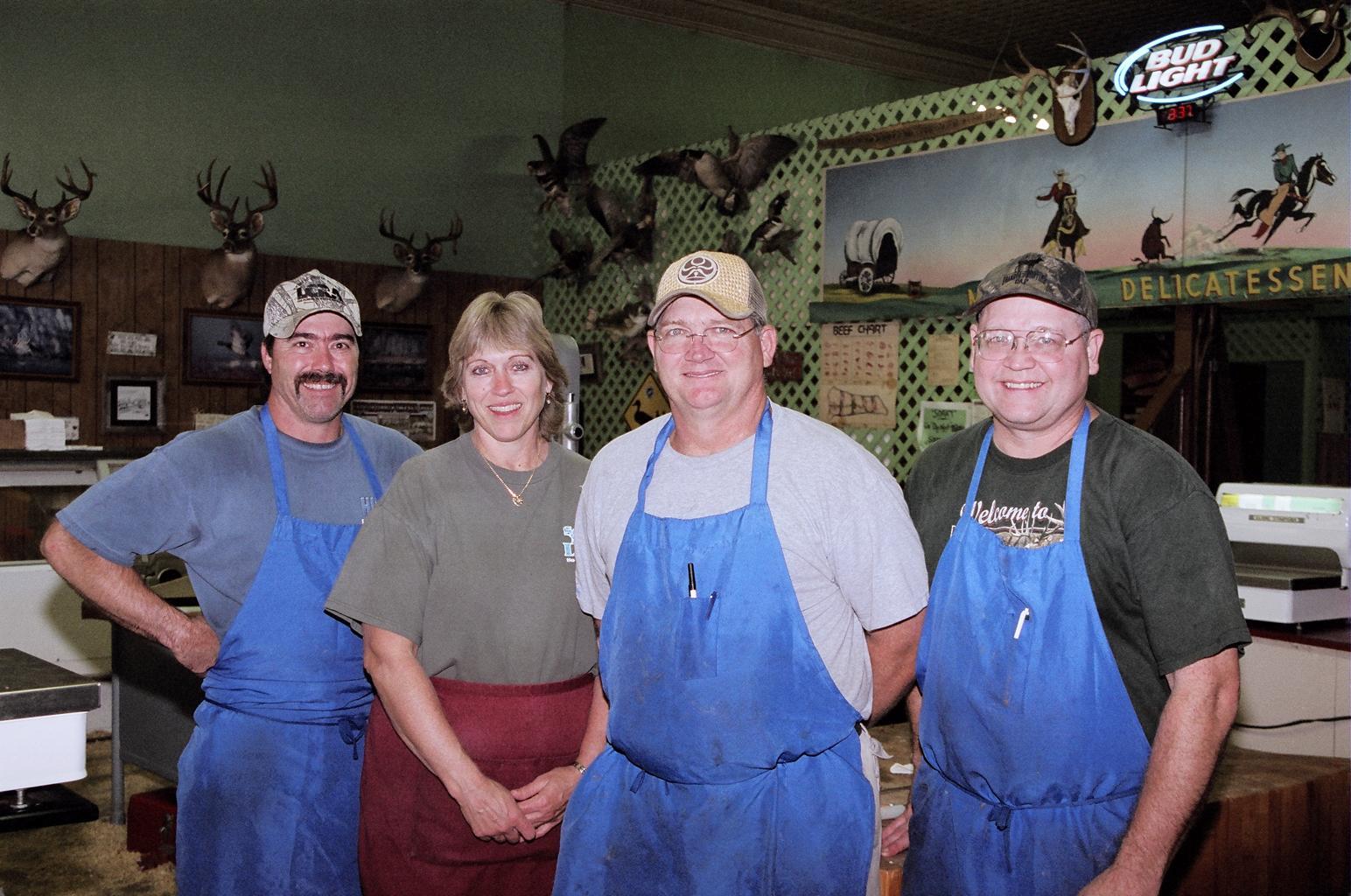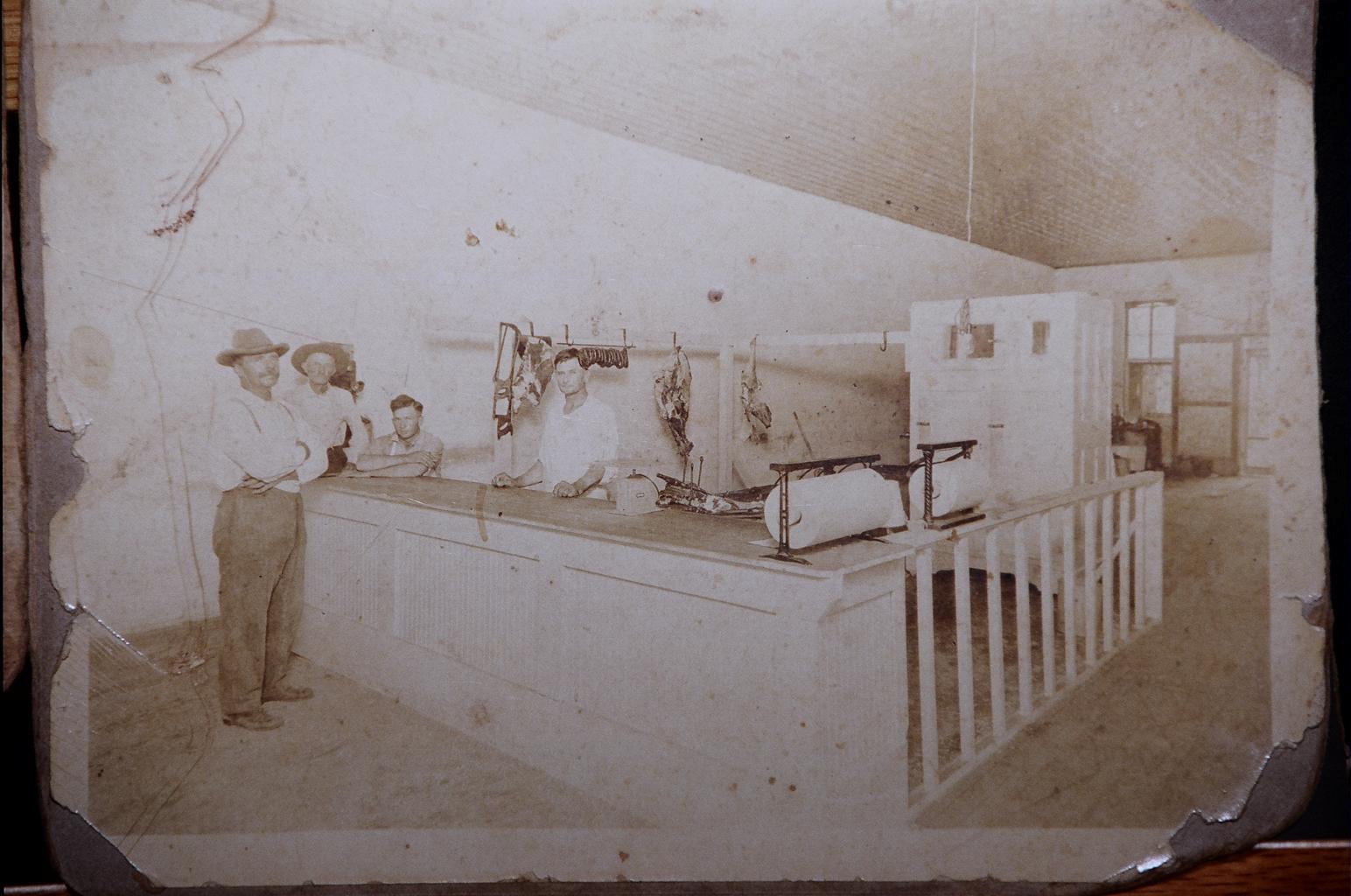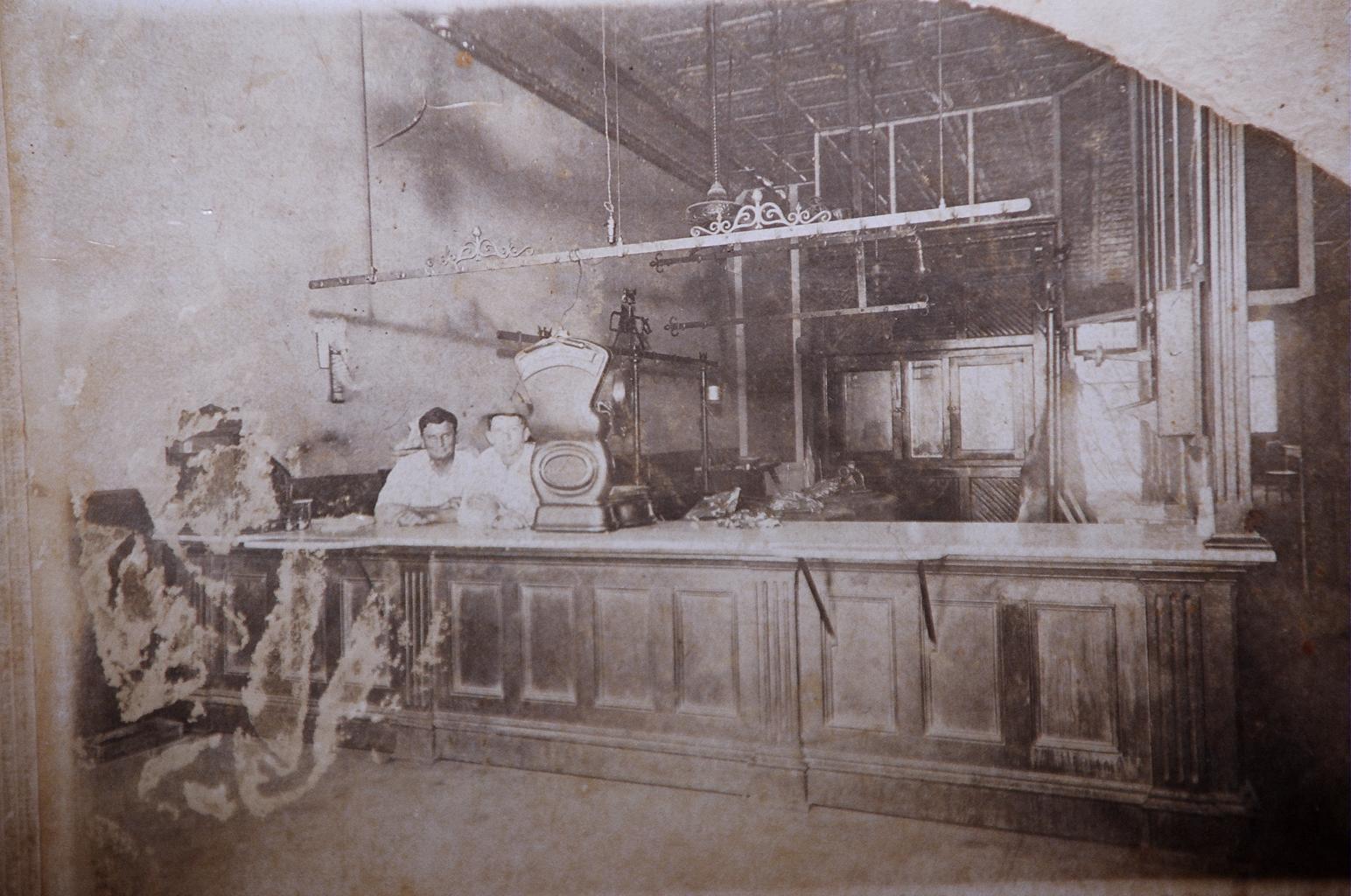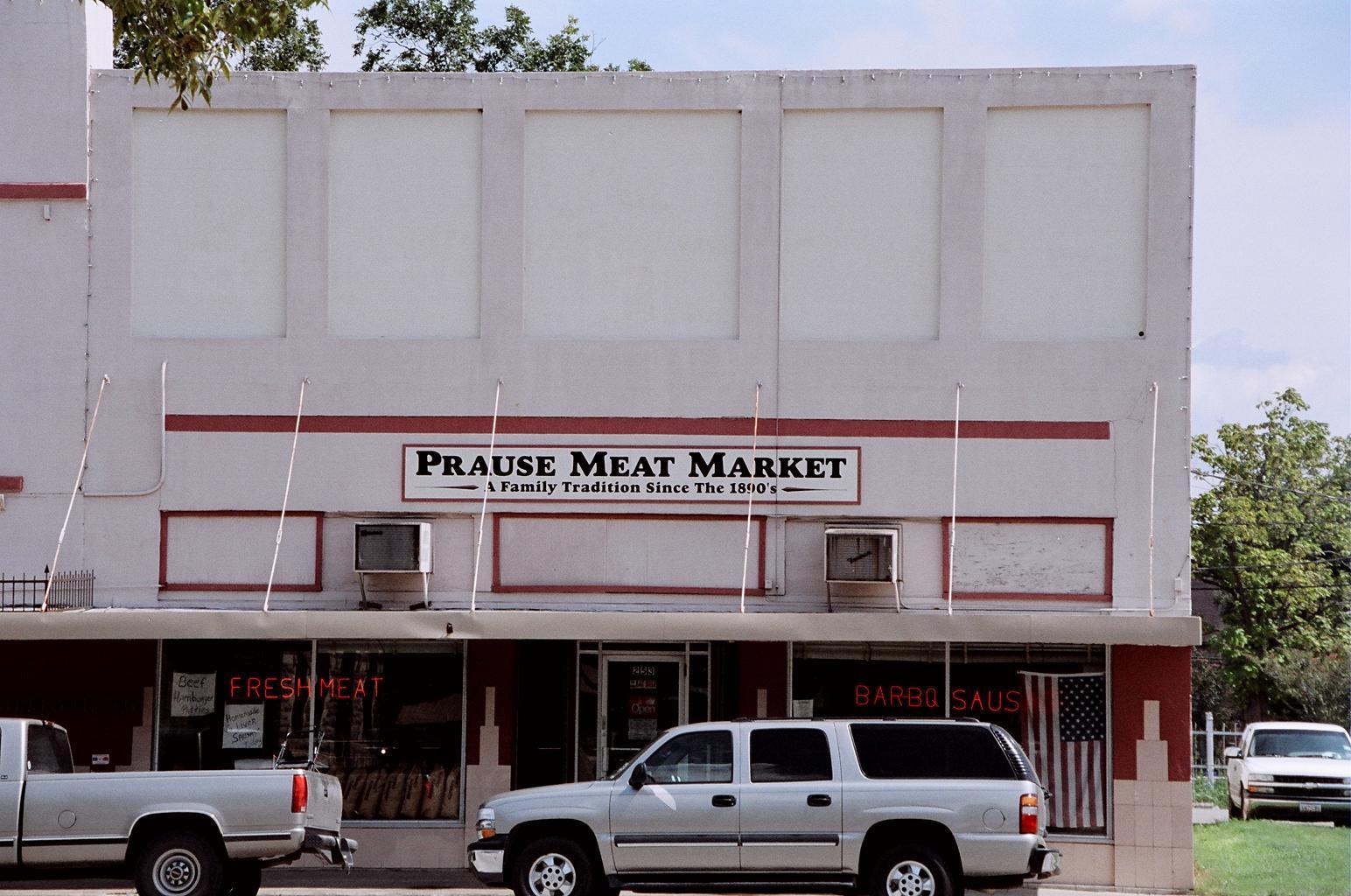Transcript of interview with Gary Lee Prause
Friday, September 9, 2005
Interview was conducted at Mr. Prause's family business "Prause Meat Market" located on the town square in downtown La Grange.
INTERVIEWEE: MR. GARY LEE PRAUSE
INTERVIEWER: MRS. JAMIE RAPP
Jamie Rapp - This is Prause (pronounced it as a plural)
Gary Lee Prause - Well we pronounce it Prause (with a long ďEĒ) Our ancestors came from Austria in the late 1700ís early 1800ís
JR - Now did they settle in La Grange first?
GP - Well my great-great-great grandfather stayed in La Grange. My great-great grandfather moved to New York, and he was in a symphony orchestra up there. Running one during Abraham Lincolnís time, during the civil war. And then our great grandfather actually he started working the meat market in Fayetteville, Texas which is about 10 -12 miles east of here. In his teenage years which was back in the 1880ís and he moved to La Grange with his family, got married had some kids then in 1903 or 1904 started the meat market up on his own. Prauseís have been in the meat business pretty well ever since.
JR - I was over taking pictures of the courthouse, and saw on your sign that you had been in business here since the 1890ís?
GP - Yea in the meat business, yea sure have.
JR - And that way by your great grandfather and grandfather?
GP - My great grandfather Ė Arnold, was the one that came from Fayetteville to here. His son Glen took it over from him when he retired. And then when Glen retired his three boys, Glen Jr., Steve and Moxie took it over, that was in the 60ís. And now they are all retired and gave it all to their kids that is me, Gary, Brian, Mark, Kathy and my brother Tommy us five have it now.
JR - When yíall were growing up though this was just part of your life wasnít it?
GP - Oh yea.
JR - When you worked you came up here to help then?
GP - Brian and I started working here when we were I guess 11 going on 12. We washed pots and pans, cleaned tables, swept the floors. That was in 1966. And we have been here ever since.
JR - Were yíall related to any of the founding fathers of La Grange? Or your family settled here pretty much after it had been established?
GP - Yea, they were in Fayetteville area and moved here around 1903-1904. So I think La Grange was pretty well settled.
JR - What do you think drew families to establish themselves in La Grange?
GP - Well you talkiní about back in the early days?
JR - Back in the 1900ís
GP - It was the county seat, thatís one thing, and if I remember correctly La Grange and Austin were up for bids to be the state capital in the mid 1800ís. The government that was formed for Texas at the time they voted and they voted Austin and La Grange was a close second.
JR - I know that yíall have lived in Fayette County and La Grange pretty much all of your lives.
GP - Pretty well yea, weíve seen it grow and things change
JR - How did your family support yourselves? The meat market was pretty much your income was it not when you were growing up?
GP - It was our soul income, starting with my grandfather, my grandmother would stay home and take care of the kids and sew for the public, fix clothes, bake cakes and stuff, sell cakes to make a little extra income. Because at that time, and even with my fatherís generation the man worked and the wife stayed home and took care of the kids. It was our only source of income, when you are in the family business you can work for less, if you have a weak month and you donít make that much money you just tighten the belt and you donít get that much stuff until you got money coming in again. And you canít fire yourself!
JR - I have a list of historical landmarks and I wanted to see if you knew of any more, I know that the courthouse is one, the jailhouse is another one. I had heard that La Bahia road was the main road that the Spaniards used to come through and then the Moore Blockhouse, which has actually been relocated to Roundtop.
GP - Now we have an old national brewery, called the Kreische Brewery.
JR - What positive changes have you seen to La Grange?
GP - La Grange is a very very tight knit community. I mean everybody knows everybody, and if there is a need it gets met. And there is back-up in case somebody canít then there is somebody that can. I think thatís a big benefit in living in a small town. Ya know living in a small town a person tends to grow up right, they have all the values that you need to be a good person, I mean when you get lost in a big city somewhere, nobody knows who you are and it is so easy to get lead down the wrong path. That is a big benefit I think that a small town has over a large town, of course as far as finances go you have to make do sometime. We could have all probably gone to a big city and got a lot more money than we are making now we sacrifice that for the kind of living that we have.
JR - You told me that your family came from Austria right?
GP - The reason they left there was because they had a plague over there where they were living. It killed practically 2/3 of the community where they were living and they decided to get out while the getting was good. And that is why they came over here to the United States, to get away from the plague.
JR - Did they end up going through Ellis Island?
GP - Iím not sure exactly how they got here, it was off the coast, and they did come up from there and they settled here in the Fayetteville / Roundtop area.
JR - What are some of your fondest memories or interesting events that have happened in La Grange during your lifetime?
GP - I guess if you would call it an event is just the fact that we are still here. Ya know life is a lot of challenges I mean not just in business but in raising a family. And just the fact that we have endured.
JR - I moved from a somewhat large town in Indiana, we lived outside of Gary to a very small town in Mississippi, Pontotoc, MS. It was just a little bit south of Tupelo. And I went from a mixed school Ė obviously Ė to Pontotoc where the black people were segregated from the whites. And I had befriended a little black girl, not realizing that in the south, this was 1967 Ė 1968 that was not allowed. Was that ever a feeling around here?
GP - Well in my grandfatherís days we had two eating sections, a white side and a colored side. Everybody had the same facilities but one sat on one side of the building and the others sat on the other side. And then back in í66 maybe í64 that is when we became mixed and it has been that way ever since.
JR - There was a lot of resentment.
GP - It takes generations to acclimate to change, just like I say it happened to us when we were kids and weíre glad of it, but just wished it would have happened sooner.
JR - Do you think businessesí will relocate to La Grange? Do you see anything happening?
GP - Town itself is pretty full, there are not many empty spots. I can see traveling businessesí building up along the bypass going through town. And there is an economic development bunch thatís got a couple tracts of land trying to entice big business to come here. I figure in the long run it is going to be easier and easier to relocate to small communities because of the internet and the high tech stuff.
JR - What do you predict for La Grangeís future?
GP - Well, I donít know, I hope for my kids that they can do what I did if they want to. And I hope that my grandkids will be able to do what I did if they want to. La Grange is a good community, a strong community I donít see anything ever happening to it. Itíll just get bigger and bigger. Ya know we are about middle ways between Austin and Houston and you know a lot of people are moving here to get away from there. And there just ainít enough spots right now for them to come to. I can just see La Grange continually growing and getting bigger and bigger and bigger.
JR - Are they any other historic stories that I havenít mentioned that you would like to share with me?
GP - I probably know a bunch of them, I just canít think right now.
JR - One of my previous interviews was telling me he was on the square when he saw Sheriff Jim pull the wig off the reporter from Houston.
GP - I didnít see that it happened oh, just about 30 yards from where we are right now. My understanding was when Flourney tore the wig of he throwed it out in the street and the first thing that ran over it was an 18 wheel trailer truck. I donít if that is what got Marvin so mad at him or what! My grandfather and father sold a lot of meat to the chicken ranch, and we always would know how many girls were out there because of the number of steaks that they would order. And Miss Edna would come in pick the meat up and leave, but that was way before my time.
GP - I can remember one time in particular when the jail behind us was still open the guy that ran the jail and his wife, they were from Ellenger, his name was Eddie, and one morning his wife come running into the market she was hollerin out ďJAIL BREAK, JAIL BREAKĒ, What had happened, Eddie was feeding one of the prisoners breakfast and the prisoner grabbed Eddie, and Eddie grabbed the jail door and slammed the door shut, locking himself inside the cell with the prisoner. He throwed the keys out of there. And the prisoner tried to get Eddieís wife to give him the keys and he would turn Eddie loose. And Eddie told her to run and go get help so she ran out the jail and ran straight into the market. My daddy was over here cutting meat with his apron on. Now back in them days you could carry a pistol in your truck, so he grabbed his pistol and run over there he ran upstairs to the jail to the cell where Eddie and that prisoner were in and he pointed that gun at the prisoner and said ďIf you donít turn Eddie loose from this cell, today is going to be your judgment day.Ē And that prisoner let dad open that door up and get Eddie out of there, and daddy come walking back, he was walking down the steps heading back over here and all the police cars come driving up on everybody, all the deputies were running up and daddy said ďItís all over with I done took care of it.Ē So that happened, that was a true story I remember that one!
JR - Okay I am curious, the sawdust on the floor, what is that for?
GP - Actually for 2 reasons, the main reason is it keeps the floor clean. If you drop a chunk of fat or meat or something drips on the floor, grease or something it just absorbs it right away and it keeps the floor clean.
JR - And is this something that your family has done since forever?
GP - For as long as I can remember.
JR - Is there anything else that you would like to share with me about La Grange that I havenít covered?
GP - No I guess not, of course youíll leave and in about 5 minutes I will think of a whole lot of stuff!
** The Prause Family have roots back to the 1880ís in Fayette County. All of the current generation were born and raised in the La Grange area. I had not met them prior to my interview. The current owners of the meat market are the fourth generation to carry on the family tradition. Family values are very important to them. And they exhibit great pride in their home town. I left with a feeling of overall goodness and wished there were more individuals like this wonderful family in all towns of America.








